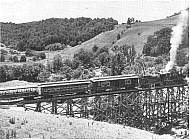Tweetsie, the 19th century, narrow-gauge engine that has survived several brushes with oblivion, is back home again in the mountains of North Carolina as perky as ever and almost good as new.
In its new role the tiny engine, which stands about 12 feet high at the stack, will pull a train of three equally ancient cars over a three-mile amusement line comprising the Tweetsie Railroad near Blowing Rock, N. C.
The pint-sized locomotive is no stranger to the pages of Ties. It was introduced to readers four years ago ( see June, 1953, issue, page 13) as it began service at Penn Laird Farm near Harrisonburg, Va., after being rescued from the scrap heap.
A destructive hurricane almost put an end to its career in 1954, after which it was sold to cowboy star Gene Autry who planned to use the train in his pictures. He decided against the move, however, and sold Tweetsie to Grover Robbins, Jr., its present owner.
Currently advertised as the only narrow-gauge steam railroad in operation east of the Rockies, the Tweetsie line lies in a mountain setting near the area the engine used to run through over a period embracing two centuries. Tweetsie, reportedly named such for Its blrd-like whIstle, was once queen of a fleet of similar engines serving the Grandfather Mountain country of North Carolina and Tennessee since 1866. .
An added thrill for Tweetsie's passengers comes from passing over an authentic replica of an 1880-vintage wooden trestle. |
 |
When the project is completed, sometime in the spring of 1958, the owners estimate they will have spent about a quarter-million dollars on it. All of which offers pretty fall. assurance that Tweetsie, the antique, misfortune-dogged locomotive, has found a permanent home at last.